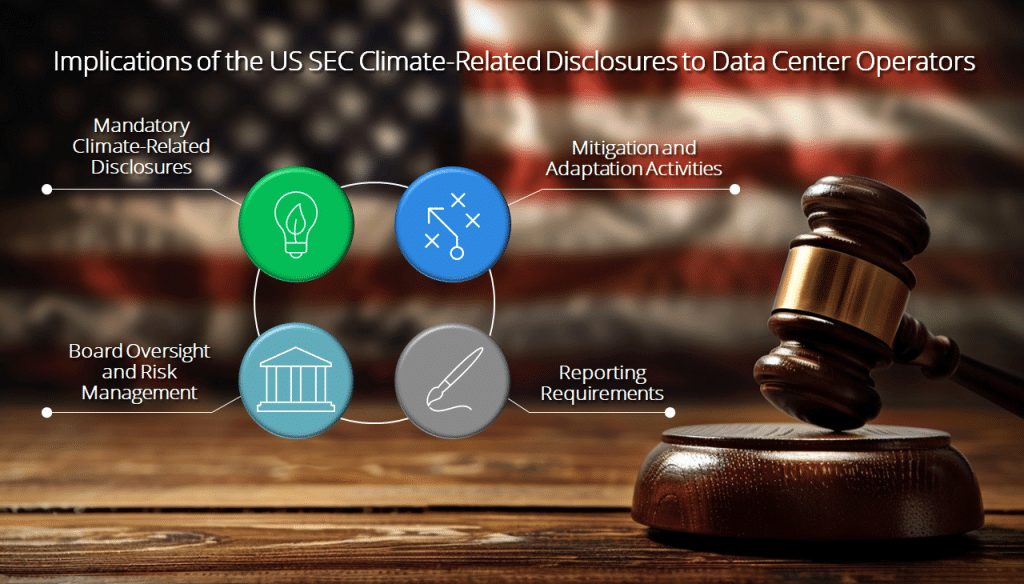Home » Blog » Sustainability » Regulations » Navigating Climate Disclosure: How SEC Rules Impact Data Center Operators
Navigating Climate Disclosure: How SEC Rules Impact Data Center Operators
Published on May 2, 2024,
by Michael Wilson
The corporate responsibility and transparency landscape is evolving, with a significant push towards more rigorous environmental accountability. The United States Securities and Exchange Commission (SEC) has recently adopted new rules to enhance and standardize climate-related disclosures. This regulatory change is poised to substantially impact various sectors, with data center operators standing as one of the key industries affected due to their significant energy consumption and environmental footprint.
Mandatory Climate-Related Disclosures
The new SEC rules mandate comprehensive disclosure of climate-related risks that are likely to have a material effect on data center operators' operations, strategies, or financial conditions. This encompasses both the present and potential future impacts of these risks on their business model and outlook. Such disclosures ensure that investors can gauge a company's resilience against the challenges posed by climate change.
The disclosure requirements focus on both qualitative and quantitative aspects. Operators must detail how climate risks affect their strategy and quantify the financial implications where possible. This includes any significant financial risks from climate change that might affect their operations or profitability.
Mitigation and Adaptation Activities
Under the new SEC regulations, data center operators must also disclose their activities aimed at mitigating or adapting to these material climate-related risks. This involves a detailed account of these actions' expenditures and financial impacts. For instance, investments in more energy-efficient infrastructure or renewable energy sources must be transparently reported.
Operators must also disclose their use of transition plans, such as how they intend to achieve carbon neutrality, scenario analysis, or internal carbon pricing mechanisms. These disclosures should provide a clear picture of the company’s commitment to addressing climate change and its strategies for navigating the transition to a lower-carbon future.
Board Oversight and Risk Management
An essential element of the SEC’s new rules is the requirement for data center operators to disclose the extent of board oversight concerning climate-related risks. Companies must describe how the board manages and integrates these risks into the broader risk management framework.
This section also requires companies to disclose their processes for identifying, assessing, and managing climate risks. The effectiveness of these processes and how they are incorporated into the company's overall risk management system is critical information for investors assessing the governance quality of a data center operator.
Reporting Requirements
Previously, companies might have chosen to include climate risk disclosures on their websites or through other informal channels. However, the new SEC rules stipulate that these disclosures must be incorporated directly into formal SEC filings, such as annual reports and registration statements. This requirement aims to standardize disclosures and make the information more reliable and accessible to investors.

Conclusion
The SEC’s new rules on climate-related disclosures are set to usher in a new era of transparency and accountability in how companies report their environmental impact. Given the industry's significant energy demands and potential ecological effects, these changes are particularly pertinent for data center operators. By adhering to these disclosure requirements, data center operators align with regulatory mandates and enhance their attractiveness to environmentally conscious investors. This shift ultimately provides investors with consistent, comparable, and decision-useful information, ensuring that the financial implications of climate risks are openly and effectively communicated.
Additional Resources
FACT SHEET The Enhancement and Standardization of Climate-Related Disclosures: Final Rule
Fundamental Measures of Data Center Sustainability eBook | Nlyte
See Nlyte in Action
Featured Posts
Expanding your Data Center is Simplified with Nlyte Software
Are there plans within your organization to expand its data center without any foresight into how to overcome the inevitable challenges? Is the Senior Leadership team asking how the data center expansion will impact the business? Fortunately, Nlyte Software has a robust Data Center Infrastructure Management (DCIM) tool, implemented by customers globally, across all verticals to help them successfully expand their data center, without unnecessary obstacles.
Reducing Data Centers' Carbon Footprint: Strategies and Tools for Sustainability
The world is facing a climate crisis, and every sector has a role in reducing carbon emissions. Data centers, the backbone of the digital age, are significant contributors to carbon emissions. The good news is…
Integrating Building Automation System and Data Center Infrastructure Management System for Sustainable Data Centers
In recent years, the demand for data centers has skyrocketed as more and more businesses and individuals rely on digital technologies to store, process, and access data. However, the energy consumption of data centers has…
How Data Centers Can Manage the Increase of Remote Workers
One week, data center management functioned as expected. The usual processes, tasks, routine checks, and personnel operations ran smoothly. Then, change began. Words like "pandemic," "stay at home," "shelter in place," and "social distancing" came…
